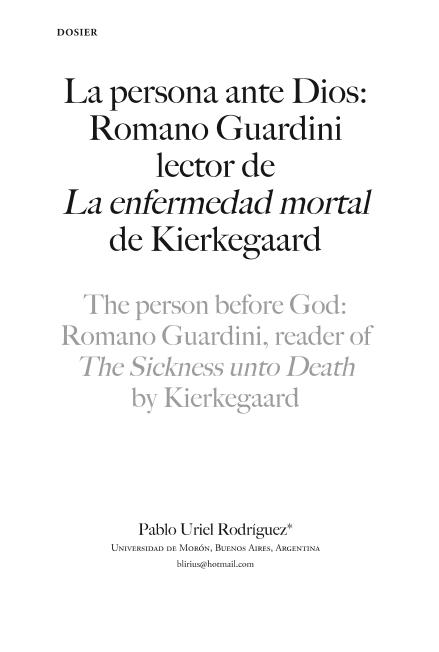Mostrar el registro sencillo del ítem
dc.contributor.author
Rodríguez, Pablo Uriel

dc.date.available
2022-08-08T14:12:06Z
dc.date.issued
2021-01
dc.identifier.citation
Rodríguez, Pablo Uriel; La persona ante Dios: Romano Guardini lector de La enfermedad mortal de Kierkegaard; Universidad Iberoamericana. Departamento de Filosofía; Revista de Filosofía; 53; 150; 1-2021; 74-112
dc.identifier.uri
http://hdl.handle.net/11336/164533
dc.description.abstract
La reflexión antropológica de Kierkegaard constituyó una de las más importantes bases del pensamiento personalista de Romano Guardini. El teólogo católico le prestó particular atención a la teoría de la subjetividad expuesta en La enfermedad mortal, a la que criticó en varios de sus ensayos y libros. El teólogo católico alemán sostiene que Anti-Climacus desarrolla una antropología dinámica que conduce a una comprensión catastrófica de la libertad humana. Comienzo señalando el modo en que el pensamiento maduro de Guardini se apropia de la noción del yo expuesta en La enfermedad mortal. A continuación, reconstruyo el análisis que realiza Guardini del libro de Anti-Climacus en dos artículos redactados durante la década de 1920. Luego, explico por qué motivo Anti-Climacus se ve obligado a defender esa antropología dinámica rechazada por el teólogo católico. Por último, indico la inspiración kierkegaardeana en la respuesta de Guardini al problema de la relación entre la libertad humana y la omnipotencia divina.
dc.description.abstract
Kierkegaard’s anthropological reflection was one of the most important foundations of Romano Guardini’s personalist thought. Guardini paid particular attention to the theory of subjectivity expounded in The Sickness unto Death, which he criticized in several of his essays and books. The German catholic theologian maintains that Anti-Climacus develops a dynamic anthropology that leads to a catastrophic understanding of human freedom. I begin by noting the way in wich the notion of self exposed in The Sickness unto Death was appropriated by Guardini’s mature thought. Then, I reconstruct Guardini’s analysis of Anti-Climacus’ book in two articles written during the 1920s. Next, I explain why Anti-Clamacus is forced to defend this dynamic anthropology rejected by the catholic theologian. Lastly, I indicate the kierkegaardean inspiration in Guardini’s response to the problem of the relationship between human freedom and divine omnipotence.
dc.format
application/pdf
dc.language.iso
spa
dc.publisher
Universidad Iberoamericana. Departamento de Filosofía
dc.rights
info:eu-repo/semantics/openAccess
dc.rights.uri
https://creativecommons.org/licenses/by-nc-sa/2.5/ar/
dc.subject
KIERKEGAARD
dc.subject
GUARDINI
dc.subject
LIBERTAD HUMANA
dc.subject
DESESPERACIÓN
dc.subject.classification
Filosofía, Historia y Filosofía de la Ciencia y la Tecnología

dc.subject.classification
Filosofía, Ética y Religión

dc.subject.classification
HUMANIDADES

dc.title
La persona ante Dios: Romano Guardini lector de La enfermedad mortal de Kierkegaard
dc.title
The person before God: Romano Guardini, reader of The Sickness unto Death by Kierkegaard
dc.type
info:eu-repo/semantics/article
dc.type
info:ar-repo/semantics/artículo
dc.type
info:eu-repo/semantics/publishedVersion
dc.date.updated
2022-08-04T15:30:42Z
dc.identifier.eissn
0185-3481
dc.journal.volume
53
dc.journal.number
150
dc.journal.pagination
74-112
dc.journal.pais
México

dc.journal.ciudad
Ciudad de México
dc.description.fil
Fil: Rodríguez, Pablo Uriel. Consejo Nacional de Investigaciones Científicas y Técnicas; Argentina. Universidad Nacional de General Sarmiento. Instituto de Ciencias; Argentina. Universidad de Morón. Facultad de Filosofía Ciencias de la Educación y Humanidades; Argentina. Universidad de Buenos Aires. Facultad de Filosofía y Letras; Argentina
dc.journal.title
Revista de Filosofía
dc.relation.alternativeid
info:eu-repo/semantics/altIdentifier/doi/https://doi.org/10.48102/rdf.v53i150.74
dc.relation.alternativeid
info:eu-repo/semantics/altIdentifier/url/https://revistadefilosofia.ibero.mx/index.php/filosofia/article/view/74
Archivos asociados
